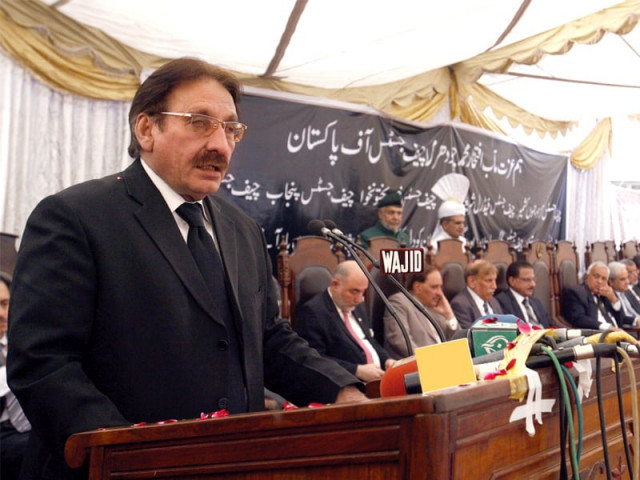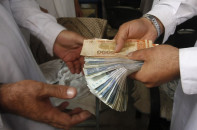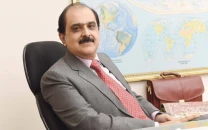National Judicial Commission: Appearance before court is a prisoner’s right: chief justice
Lauds lawyers, bar and bench for role in judicial system’s independence.

Appearance of under-trial prisoners before court is a statutory right which must not be compromised at any cost, noted members of the National Judicial Commission at a meeting on Saturday.
Members of the judicial committee also observed that after implementation of the National Judicial Policy (NJP), the disposal rate of cases has improved. The meeting was chaired by Chief Justice Iftikhar Muhammad Chaudhry.
“The judiciary is mindful of the fact that not only justice is done, but it must also be seen to have been done,” the chief justice said.
“For this reason, I have asked the high courts to designate their judges for physical verification of data of disposal of old cases in the district judiciary,” he added.
The committee observed that while there is scope for improvement, the figure of disposal is quite encouraging and shows the confidence of people in the judiciary to resolve their cases and protect their rights.
The chief justice reiterated that for restoration of confidence in the formal justice system, chief justices of the high courts should show zero-tolerance for corruption and corrupt practices.
He also issued strict directions for disciplinary action against judicial officers and court staff, if found involved in corruption.
The committee took into consideration various factors hindering the process of dispensation of justice, including non-submission of chalans, delay in investigation and non-production of under-trial prisoners, and resolved that registrars, home secretaries, IG prisons and directors (reclamation and probation) should have regular meetings for monitoring and improving the performance of their respective institutions in the administration of justice.
The committee also took serious note of the deplorable condition of prisoners and observed that there is a dire need for construction of new jails.
Address at PHC
The historic lawyers’ movement has imposed a greater responsibility on judges to meet public expectations for dispensation of justice, the chief justice said.
“Although certain impediments remain to an independent judiciary, the fact is that lawyers have contributed to strengthening the institution,” he told lawyers at the Peshawar High Court on Saturday. “Lawyers are duty-bound to promote respect for rule of law in society, which is the basis for democracy.”
The chief justice also lauded the role of bar associations in the 2007 lawyers’ movement. “It’s evident from the course of our legal history that although the struggle for rule of law and independent judiciary was started by lawyers individually, bar associations never lagged behind in this respect.”
“Being wheels of the same chariot of justice, they [bench and bar] endeavour individually and collectively to achieve the common objective of administration of justice.”
Earlier, Peshawar High Court Chief Justice Dost Muhammad Khan said that 900 missing persons had been identified and 67 had been freed. “We don’t want to release anyone unlawfully but we will not let anyone violate the law either.”
Assuring the chief justice of unconditional support from lawyers in Khyber-Pakhtunkhwa, Justice Khan said: “When it comes to sacrifice, I assure you that these lawyers are your unpaid army regiment.”
Published in The Express Tribune, April 1st, 2012.



















COMMENTS
Comments are moderated and generally will be posted if they are on-topic and not abusive.
For more information, please see our Comments FAQ